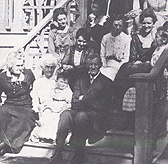Family Folklore
How to Collect Your Own Family Folklore
A Possible Questionnaire
Every family is unique. Every folklore fieldworker has his or her own special interests and style of interviewing. Because of this diversity, no single set of questions will successfully elicit folklore from all families. The most useful questions will be those that you develop through knowledge of yourself and your family.
For your initial efforts the following questions may be helpful. Just remember that they are meant to be suggestive, not absolute. Pick and choose among them as you see fit. By all means change the wording to suit your own situation and personality.
SAMPLE INTERVIEW QUESTIONS
1. What do you know about your family surname? Its origin? Its meaning? Did it undergo change coming from the old country to the United States? Are there stories about the change?
2. Are there any traditional first names, middle names, or nicknames in your family? Is there a naming tradition, such as always giving the firstborn son the name of his paternal grandfather?
3. Can you sort out the traditions in your current family according to the branches of the larger family from which they have come? Does the overall tradition of a specific grandparent seem to be dominant?
4. What stories have come down to you about your parents? Grandparents? More distant ancestors? How have these relatives described their lives to you? What have you learned from them about their childhood, adolescence, schooling, marriage, work, religion, political activity, recreation? Are they anxious or reluctant to discuss the past? Do their memories tend to cluster about certain topics or time periods and avoid others? Are there certain things in your family history that you would like to know, but no one will tell you? Do various relatives tell the same stories in different ways? How do these versions differ?
5. Do you have a notorious or infamous character in your family's past? Do you relish stories about him/her? Do you feel that the infamy of the ancestor may have grown as stories passed down about him/her have been elaborated?
6. How did your parents, grandparents, and other relatives come to meet and marry? Are there family stories of lost love, jilted brides, unusual courtships, arranged marriages, elopements, runaway lovers?
7. Have any historical events affected your family? For example, how did your family survive the Depression? Did conflict over some national event such as the Civil War or Vietnam War cause a serious break in family relationships?
8. Are there any stories in your family about how a great fortune was lost or almost (but not quite) made? Do you believe them? Are these incidents laughed about or deeply regretted? If a fortune was made, who was responsible and how was it achieved?
9. What expressions are used in your family? Did they come from specific incidents? Are there stories which explain their origin? Is a particular member of the family especially adept at creating expressions?
10. How are holidays celebrated in your family? What holidays are most important--national, religious, or family? What innovations has your family made in holiday celebrations? Has your family created entirely new holidays?
11. Does your family hold reunions? How often? When? Where? Who is invited? Who comes? Who are the organizers and hosts? What occurs during the reunion? Are there traditional foods, customs, activities? Are stories and photographs exchanged? Are records (oral, written, visual) kept? By whom?
12. Have any recipes been preserved in your family from past generations? What was their origin? How were they passed down--by word of mouth, by observation, in writing? Are they still in use today? When? By whom? Does grandmother's apple pie taste as good now that it's made by her granddaughter?
13. What other people (friends, household help, etc.) have been incorporated into your family? When? Why? Were these people given family titles such as aunt or cousin? Did they participate fully in family activities?
14. Is there a family cemetery or burial plot? Who is buried with whom? Why? Who makes burial place decisions? If there are gravemarkers, what type of information is recorded on them?
15. Does your family have any heirlooms, objects of sentimental or monetary value, that have been handed down? What are they? Are there stories connected with them? Do you know their origin and line of passage through the generations? If they pass to you, will you continue the tradition, sell the objects, or give them to museums?
16. Does your family have photo albums, scrapbooks, slides, home movies? Who created them? Whose pictures are contained in them? Whose responsibility is their upkeep? When are they displayed? To whom? Are they specially arranged and edited? Does their appearance elicit commentary? What kind? By whom? Is the showing of these images a happy occasion?